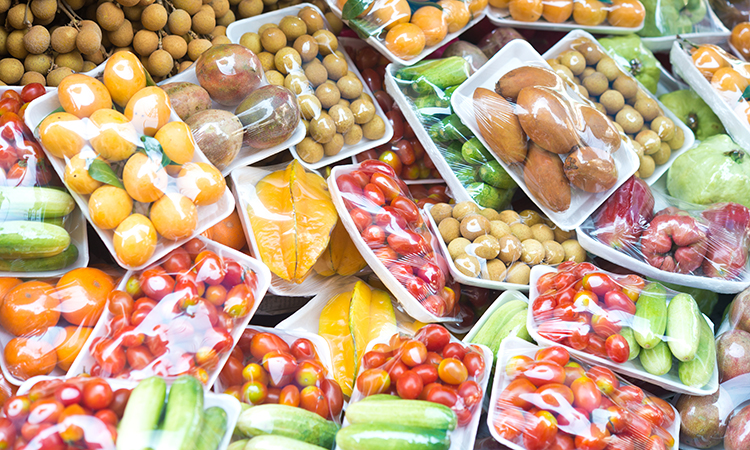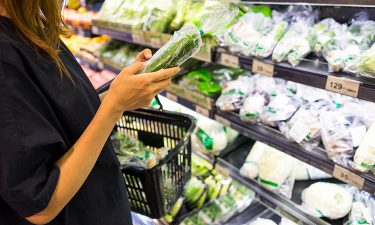Our plastic dilemma
Posted: 8 January 2021 | Dr. Sylvain Charlebois | 1 comment
With little knowledge of how COVID-19 transmits, consumers have returned to single-use plastics. Here, Dr Sylvain Charlebois looks at how food protection measures have been affected.


The pandemic has disrupted our lives in more ways than one; among the most noticeable is our use of plastics.
As nations went into lockdown, the western world saw regulations and bans related to single-use plastics and plastic packaging relax in a matter of days. Once high on the social and political agenda, the focus on public health completely overrode everything else, including our desire to become better environmental stewards.
As the pandemic struck, consumers focused on being food secure, buying products which they deemed to be Covid-safe. This spurred a new demand for single-use plastic packaged foods, despite worldwide Government opinion suggesting the probability of catching the virus through food was “very unlikely”.
Now, after months of uncertainty and anxiety, we can afford to take stock of what has happened to food protection measures and how they correspond with our aspirations to take care of the planet.
The pandemic has disrupted our lives in more ways than one; among the most noticeable is our use of plastics.
As nations went into lockdown, the western world saw regulations and bans related to single-use plastics and plastic packaging relax in a matter of days. Once high on the social and political agenda, the focus on public health completely overrode everything else, including our desire to become better environmental stewards.
As the pandemic struck, consumers focused on being food secure, buying products which they deemed to be Covid-safe. This spurred a new demand for single-use plastic packaged foods, despite worldwide Government opinion suggesting the probability of catching the virus through food was “very unlikely”.
Now, after months of uncertainty and anxiety, we can afford to take stock of what has happened to food protection measures and how they correspond with our aspirations to take care of the planet.
Fear takes over
The Agri-Food Analytics Lab at Dalhousie University in Canada recently released a report on the issue of single-use plastics in the food industry in one year. The aim of the survey was to understand how the COVID-19 pandemic impacted Canadian consumers’ attitudes towards single-use plastic food packaging. The report, which compares two cross-national surveys, garnered interesting results.
The initial survey was conducted in 2019, while the most recent was carried out in the midst of the pandemic. The percentage of respondents actively shopping for non-plastic packaged goods is essentially unchanged, from 58 percent in 2019 to 60 percent in 2020.
“Since the novel coronavirus, 29 percent of respondents said they are buying more plastic‑packaged goods”
While the vast majority of Canadians continue to recognise the environmental impacts of plastics, 2020 results see a small but measurable decline in concern (from 91 percent to 87 percent), and in consumers’ motivation to avoid plastics (from 89 to 85 percent), with steeper declines among men. On the surface, not much appears to have changed, until we look at behaviour and assess how the economy may have affected how consumers perceive alternatives to keep food safe.


Although most people still recognise the environmental impacts of plastics, we have seen a measurable decline in concern this year
Since the novel coronavirus, 29 percent of respondents said they are buying more plastic‑packaged goods, with women more likely than men to buy plastics (34 vs 25 percent). The younger generation are buying the most, with 47 percent of 18- to 25-year-olds and 34 percent of 26- to 39-year-olds reporting an increase in their plastic packaging consumption. However, this may be because younger consumers ordered more pre-prepared foods from restaurants and meal kit providers than other consumers.
Comparing the two surveys, food safety concerns seem to be a determinant over sustainability. In fact, 55 percent of respondents are more concerned about food safety since Covid; particularly female, urban respondents and those located in BC and the Atlantic. The Covid pandemic has clearly altered the landscape of consumer opinion on plastic packaging.
Since the pandemic, 40 percent of respondents deemed new safety concerns to be either “very important” or “extremely important” to their decisions about buying plastic-packaged goods. New safety concerns were most important for respondents who were female, older, had lower incomes, and fewer children.
The will to regulate more was also affected by the pandemic. In 2019 there was support for both stronger regulations on plastics (90 percent in agreement) and for a single-use plastics ban (70 percent in agreement), with backing equally split between men and women.
“Food safety concerns seem to be a determinant over sustainability”
In 2020, this support declined by 11 percentage points and support for a ban dropped by 12 points. Male and female attitudes have diverged, with women continuing to support bans and regulations, while support among men fell sharply.
Covid may have made people forget about the impacts of our plastic addiction, but the problem still exists. Despite this, more than half of respondents believe that new regulation should be put on hold until after the pandemic has been resolved. The question is, how long will that be?
Before Covid, we were seeing some (albeit slow) movement among grocers on the food packaging front. For example, last year retailer Loblaw announced it was partnering with TerraCycle, an American-based company that specialises in consignment packaging, for a one-year pilot project in the Toronto area.
TerraCycle’s zero-waste shopping platform, known as Loop, is designed to enable consumers to responsibly consume a variety of commonly used products in customised, brand-specific durable packaging that is delivered in a reusable shipping tote. When a consumer is finished with the product, the packaging is collected, cleaned, refilled and reused – creating a revolutionary circular shopping system.
Methodology:
A representative survey of Canadian consumers was carried out from 10-14 July 2020 in partnership with Angus Reid. A total of 977 valid responses were collected. In order to observe changes over time, we compared these recent results with baseline data collected by the lab through an earlier survey of 1,014 Canadians conducted between 13-18 May 2019.
Margin of error:
Each sample carries a margin of error of +/-3.2 percentage points, 19 times out of 20. Discrepancies in or between totals are due to rounding.
It will be interesting to see whether consumers embrace the Loop’s programme at Loblaw’s. The same studies released by Dalhousie University suggested that while 93.1 percent of Canadians want the plastic issue to disappear, only 23.2 percent of them would accept paying a fee to a food company for reusable food packaging. Furthermore, most Canadians would not accept rising food bills in return for pricy circular economy models, despite the environmental perks. The public response is far from convincing, and the global economic downturn generated by COVID-19 has only made things worse.
This is likely why Loblaw opted to run a pilot with Loop, rather than committing to a full-blown, nationwide initiative. Loblaw is clearly challenging Canadians to become better environmental stewards and investing partners, as it were. Literally everyone – industry, Governments and consumers – want less plastic in the food industry but at the core of this issue is cost.
The environmental factor, as with the issue of food safety, has zero market currency. Charging more for an eco-friendly programme in food retailing remains a non-starter for most Canadians, with consumers unwilling to pay more to resolve our plastic issue.
However, the plastics legacy in food goes beyond discussions of pollution, which we have all seen in the media. As a cheap material, plastics have kept food affordable and safe, as well as reducing the amount of food waste we all generate. As much as plastics have become this ‘despicable monster’ to our society and our current course remains unsustainable, eliminating plastics in the food industry is no easy task.
Our way of life and food safety expectations can only force the food industry to use more plastics if current practices are not altered. For one thing, single servings of ready-to-eat, portable portions are more popular than ever. More people live alone or will eat on-the-go, and these servings require more packaging and, thus, more plastics. Secondly, new food safety rules, which are now being implemented for better traceability, are putting excess pressure on the food industry to use more packaging. Most of our food safety regulations are not really aligned with the industry’s environmental obligations.
Judging from last year’s Dalhousie report, which showed that consumers valued the environment over food safety, I believe that at some point, we will start to see our planet prioritised again.
Our journey to a food world with less plastics will not be easy and will require combined efforts from industry and consumers. I expect more industry initiatives will emerge in the coming months from those companies that are unable to wait for Government to take the lead. As with many issues, industry is always ahead of policy, and the plastics dilemma is no exception.
About the author
Dr Sylvain Charlebois is a professor of food distribution and policy in the Faculties of Management and Agriculture at Dalhousie University in Halifax, Canada. He is also the Senior Director of the Agri‑food Analytics Lab, also located at Dalhousie University. His current research interests lie in the areas of food distribution, security and safety.
Issue
Related topics
COVID-19, Health & Nutrition, Packaging & Labelling, Regulation & Legislation, retail, Supermarket, Sustainability










You see, I think plastic on the one hand protects food and on the other it affects the environment, but now because of the pandemic, it serves us something because we get fresh food and we avoid any contagion.